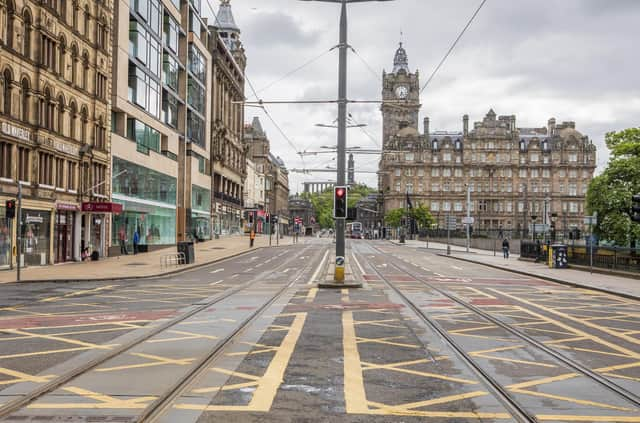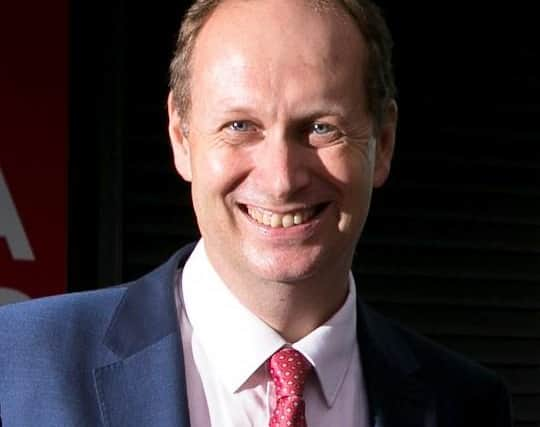Edinburgh's economy faces tough fightback from Covid crisis, warns city-based expert


EDINBURGH’S economy faces a hard struggle to recover from the Covid crisis, a city-based expert has warned.
Professor Chris Carter, of Edinburgh University’s business school, said the Capital’s mixed economy had traditionally been a strength, but most of its key sectors had been badly hit by coronavirus.
Advertisement
Hide AdAdvertisement
Hide AdAnd at national level, he argued continued government intervention in the economy was essential or the consequences would be “too catastrophic to contemplate”.


A report by accounting firm KPMG earlier last week forecast Edinburgh will have the slowest recovery of all local authorities in Scotland due to its reliance on tourism, hospitality and higher education.
And official figures showed the UK economy had shrunk by a massive 20.4 per cent in April - the biggest ever recorded.
Professor Carter told the Evening News: “Edinburgh is a vibrant prosperous economy and has been so for a long time. Outside of London and the south-east of England, it’s probably the most vibrant and prosperous in the UK.
Advertisement
Hide AdAdvertisement
Hide Ad“And its historical strength is that it has always been a mixed economy - financial services, universities, travel and tourism, cultural festivals and so forth. If one was down a bit, the others would compensate.
“That’s why it didn’t go through the horrendous experiences of Glasgow and Newcastle and other cities in the 1980s when they were heavily reliant on a narrow set of industries.
“So Edinburgh is strong traditionally, it’s a mixed economy, it’s the seat of government, but you’ve got to think travel and tourism will take a while to come back. These things are really difficult to call, but it’s going to be hard in that sector. Travel, tourism, festivals - they’re all facing really difficult times.”
The record 20.4 per cent downturn in the UK economy during the first full month of the cornoavirus lockdown was three times greater than that experienced during the financial crisis in 2008.
Advertisement
Hide AdAdvertisement
Hide AdAnd Professor Carter said suggestions that the economy could bounce back in a year or two seemed “very optimistic” to him.
He said barring some sort of mass government-backed employment scheme, there was bound to be a big increase in the number of jobless.
But he said there were good arguments for government help for businesses facing a hard fightback.
“The government needs to avoid as much economic scarring as possible, so businesses that were good businesses going into the crisis need to be supported. If they go, that’s it. They won’t come back.
Advertisement
Hide AdAdvertisement
Hide Ad“All economies recover eventually, but you want it to recover as soon as possible - and the economic point is what will be important is growth rather than debt over the long term.
“There are lots of nice places to go and eat in Edinburgh and lots of nice places to stay. It would be an absolute tragedy if they were to go out of business.
“Conversely there were probably businesses that were just hanging on and this crisis accelerates those trends.
“And this is the point at which we see the peak crisis for the high street. What will the high street look like in two years time? Probably quite different.”
Advertisement
Hide AdAdvertisement
Hide AdProfessor Carter praised Chancellor Rishi Sunak for his readiness to step in with government cash at the start of the lockdown, including the furlough scheme paying 80 per cent of wages, and grants and loans for businesses and the self-employed.
The furlough scheme will soon be phased out and it is not yet clear what further financial support might be available in the coming months.
Professor Carter said: “Rishi Sunak has played it well - he was quick to grasp the enormity of the situation. But this is the point where, if the government doesn’t intervene and continue to intervene, then we’re looking at an economic slump and frankly the consequences of that are too catastrophic to contemplate.
“I would hope the government would do whatever it takes. We’re going to have a period where the state is back - big government is going to be here to stay.
Advertisement
Hide AdAdvertisement
Hide Ad“Britain is a service economy and, as we found in the financial crash, we’re particularly exposed.
“It’s a time to think medium and long term about what sort of economy we want, what sort of economy works for people.
“And it’s a time for key decision-makers to hold their nerve and for government not to be afraid of debt and to recognise we need to hold as much of the economy together as possible, even if that means incurring debt.”
And he compared the scale of the task to the challenge of setting up the welfare state in the wake of the Second World War. “What is required is a
Advertisement
Hide AdAdvertisement
Hide AdBeveridge-style report to think about how we get all this going.”
The hospitality and tourism industry has been given a provisional date of July 15 when it could reopen for business so long as the virus is under control.
But many firms and trade organisations have voiced concerns about what restrictions they will have to operate under, warning that for a lot of businesses, the current two-metre rule on physical distancing would make it not economically viable to reopen.
And that has raised the prospect of major job losses in the sector as staff who had previously been furloughed are made redundant.
Advertisement
Hide AdAdvertisement
Hide AdThe furlough - or job retention - scheme will be phased out by the end of October, but many tourism-related businesses depend on their summer takings to survive the rest of the year and having lost most, if not all, of this year’s season they may not be able to keep going until next summer.
The SNP has written to the Chancellor, calling for specific support for the sector, including converting loan schemes to grants to prevent firms taking on unmanageable debt and being pushed further into hardship; extending the job retention scheme and support for the self-employed; and ending VAT for the tourism sector.
Drew Hendry, SNP business spokesman at Westminster, said: “The support schemes and business rates holidays brought forward by the UK government have been welcome in the short-term, but time is fast running out for the future of the sector as the Treasury seeks to wind down its schemes.
“It’s critical that the Treasury heeds the calls to strengthen support and brings forward a financial relief package to help the industry weather this devastating storm.
Advertisement
Hide AdAdvertisement
Hide Ad“Other countries are already leading the way by injecting investment into their tourism industries. The right financial support and the ingenuity of the sector will allow us to save the tourism sector, protect thousands of jobs and ensure a strong economic recovery.”
Comment Guidelines
National World encourages reader discussion on our stories. User feedback, insights and back-and-forth exchanges add a rich layer of context to reporting. Please review our Community Guidelines before commenting.